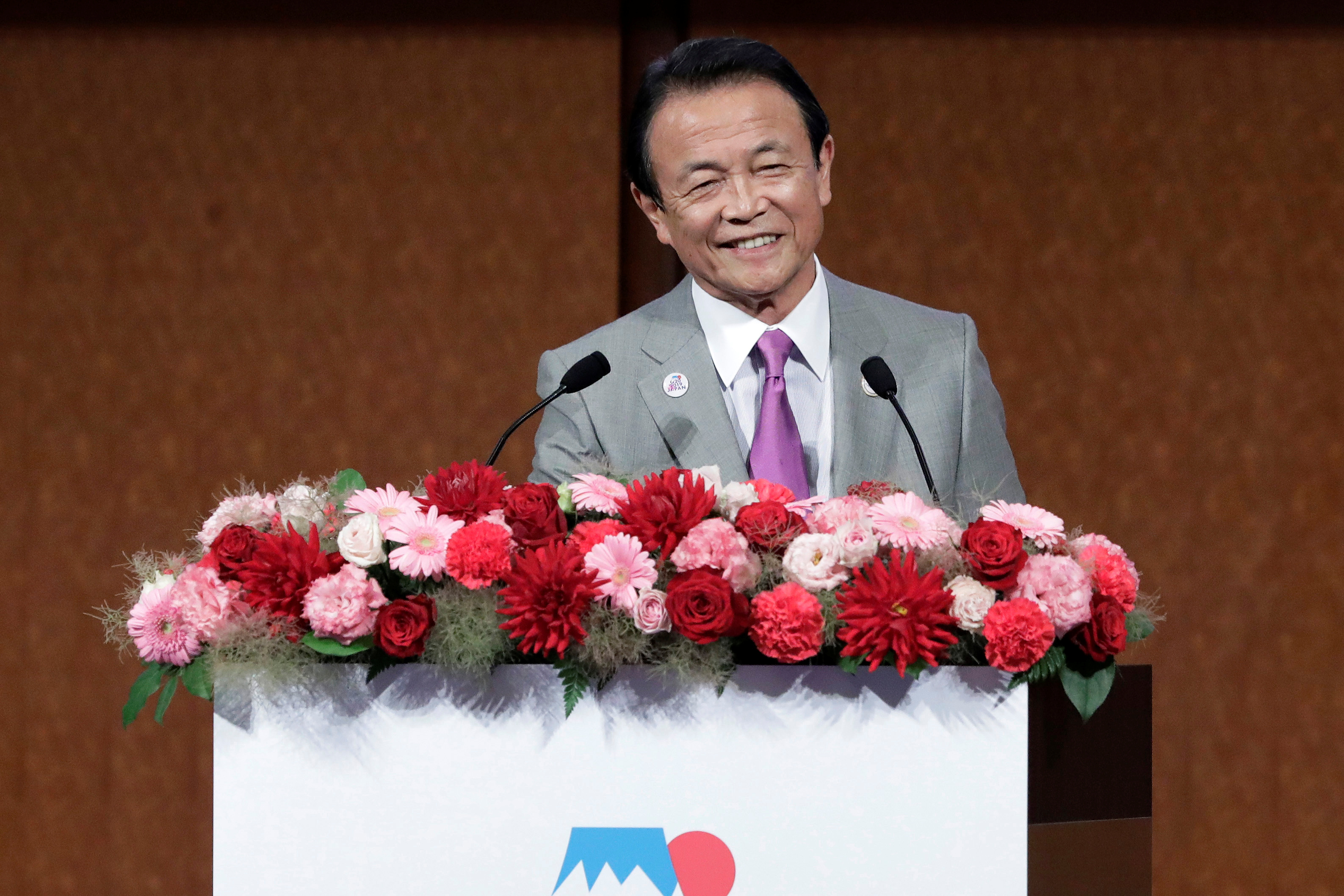TOKYO: Japan’s budget for next fiscal year won’t set a spending cap on requests aimed at fighting the Covid-19 pandemic, the finance minister said, suggesting the heavily indebted government would ramp up efforts to revive the coronavirus-battered economy.
The government would ask ministries to keep requests for other spending in line with the current fiscal year’s initial budget totalling a record high of 102.7 trillion yen, Finance Minister Taro Aso said at a cabinet meeting.
It would then set aside an unspecified amount of budget requests to respond to “urgent” expenses to battle the fallout from the coronavirus.
Japan’s fiscal year runs through April to next March.
The budget ceiling is usually set around mid-year by the Ministry of Finance (MOF) to keep a tab on spending requests from ministries for next year’s budget to be compiled in December.
“Response to the novel coronavirus remains as urgent task,” Aso was quoted as telling a cabinet meeting. “On the other hand, there’s a limit to foresee how to respond with budget spending.”
The pandemic has taken a heavy toll on the world’s third-largest economy, which is in the grip of its worst postwar recession.
Prime Minister Shinzo Abe’s government has rolled out a combined stimulus spending worth $2.2 trillion, which has boosted the size of annual budget spending to 160 trillion yen with new debt issuance totalling 90 trillion yen.
The virus stimulus spending came on top of bulging welfare costs to support the ageing society, which Aso said would be taken into consideration during budget compilation by the year-end.
The finance ministry will examine the requests and finalise the size of spending in December when it drafts next year’s budget. The deadline for budget requests was delayed by one month to end-September due to uncertainty caused by the coronavirus.
Exports plunge
Japan’s exports plunged at a double-digit pace for the fourth month in a row in June, backing signs the coronavirus crisis has knocked the economy into its worst postwar recession and raising the spectre of a longer and more painful global downturn.
US-bound Japanese shipments nearly halved again due to plummeting demand for cars and autoparts, while exports to China remained weak, pointing to the absence of a strong growth engine for the world economy.
Ministry of Finance (MOF) data showed on Monday that Japan’s exports dived 26% in June from a year earlier, bigger than a 24.9% decline seen by economists in a Reuters poll. The contraction slowed slightly from the 28.3% fall in May, which was the worst downturn since September 2009.
Global demand for cars and other durable goods has sunk since March as the pandemic prompted many countries to lockdown.
Though more countries have now started re-opening their economies, analysts say the trade data could diminish hopes for a quick rebound in global demand and Japan’s export-led economy, especially given the resurgence of coronavirus cases in major economies like the United States, Brazil and India.
The International Monetary Fund last month forecast global output will shrink by 4.9% this year, versus a 3.0% contraction predicted in April. It also predicted a slower recovery in 2021, with growth of 5.4% for the year compared with a 5.8% rise seen in April.
“Exports are likely to seesaw for the time being,” said Takeshi Minami, chief economist at Norinchukin Research Institute. “If domestic and external demand remain sluggish for a prolonged period, supply capacity could be slashed, triggering a jump in bankruptcies and job losses in the latter half of this fiscal year.”

Shipments to the United States – Japan’s key market – dived 46.6% in June, due to a 63% decline in exports of automobiles, 56% drop in airplane engines and 58% fall in car parts. Photo: Reuters.
Car shipments sink
The latest slump was aggravated by a massive annual decline in US-bound car shipments, a major export item for the Asian giant.
Overall shipments to the United States – Japan’s key market – dived 46.6%, due to a 63% decline in exports of automobiles, 56% drop in airplane engines and 58% fall in car parts.
Nissan Motor Co, Japan’s No-2 automaker, plans a 30% year-on-year cut in global car output through December as falling demand due to the Covid-19 pandemic complicates its turnaround efforts, two sources told Reuters.
In 2018, the United States was Japan’s largest export market, followed closely by China and led by cars and car parts.
Exports to China, Japan’s largest trading partner, fell 0.2% in the year to June, as declines in shipments of chip-making machinery and chemical materials more than offset increase in nonferrous metal and car shipments.
Shipments to Asia, which account for more than half of Japanese exports, declined 15%, and exports to the European Union fell 28.4%.
Japan slipped into recession for the first time in 4-1/2 years in the first quarter and is on course for its deepest postwar slump as the health crisis hurt businesses and consumers.
The world’s third-largest economy is forecast to contract 5.3% this fiscal year, the biggest contraction since comparable data became available in 1994, followed by a 3.3% bounce next year, a Reuters poll of over 30 economists shows.
Reflecting weak demand and declining oil prices, imports fell 14.4% in the year to June, versus a 16.8% decrease seen by analysts, leading to a trade deficit of 268.8 billion yen ($2.5 billion).
The Bank of Japan has signalled confidence the economy will emerge from the slump and has ruled out the risk of deflation, although policymakers have debated such a prospect in the face of the pandemic-induced global slump in demand and prices.
























